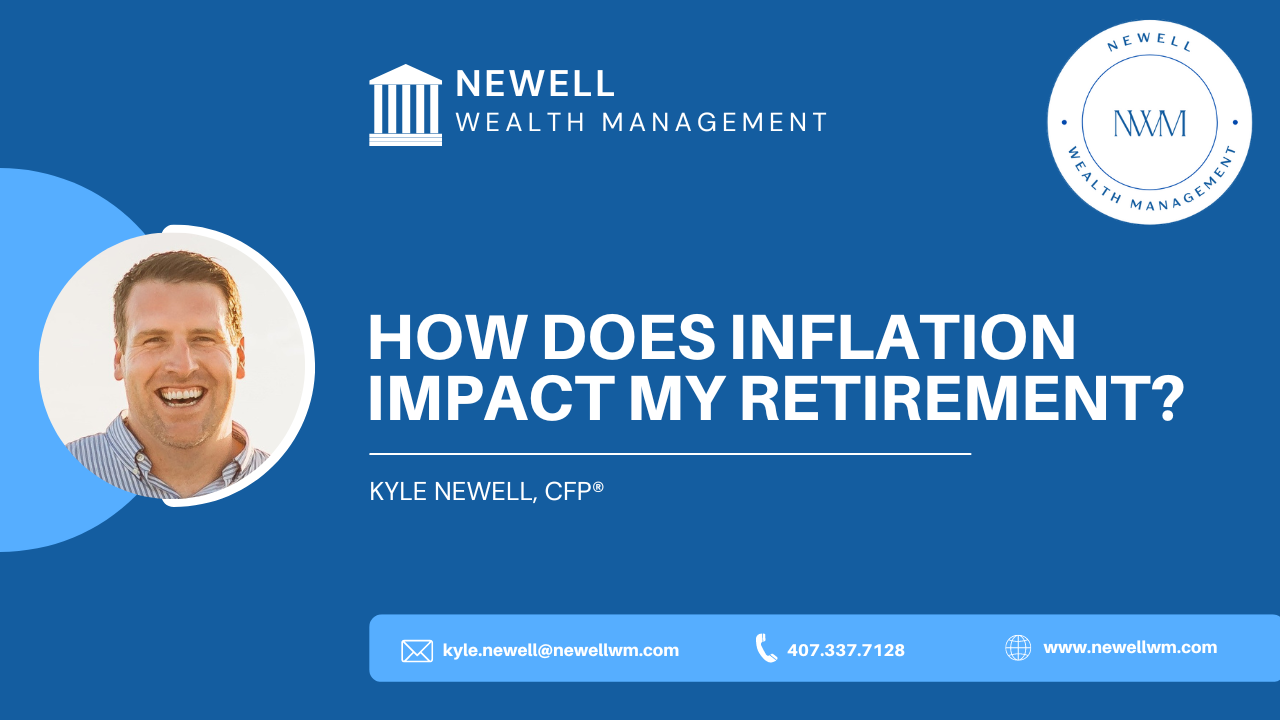How Does Inflation Impact My Retirement?

Inflation refers to the phenomenon of prices rising over time. It is currently a widely discussed topic due to its recent surge to all-time highs not seen since the 70s. Many people are concerned about how inflation affects their retirement and financial planning for other long-term goals. Let’s talk about it.
What Causes Inflation?
Many factors cause inflation to occur. The primary driver is population growth. Generally, our population has been growing across the US economy, yet the growth rate has been slowing. The current slowing growth rate is a concern for some, and in my opinion, rightfully so.
The bottom line is that prices must increase to keep up with the demands of population growth. More people equal more demand for items which leads to the second main inflation driver.
Supply and Demand
Think back to your high school economics class and the concept of supply and demand. As demand increases, supply needs to increase, causing prices to rise.
The supply side of the economy has been battered over the past several years due to the COVID-19 pandemic. The supply chain was significantly disrupted. Factories were closed, and people were unable to work due to lockdowns. This caused companies in the U.S. and overseas to produce less or halt production altogether. The supply side tightened and has been unable to keep up with demand.
To try to help economies, money was pumped into the economic system. The funds increased demand, but suppliers are struggling to catch up. These two factors combined have resulted in our current high inflation rates. The Federal Reserve is now starting to deal with the issue.

Inflation and Retirement Planning
1) Plan for Inflation.
When planning for retirement, it’s crucial to account for inflation. I’ve met with people over the years who are trying to plan their retirement who say, “I need $X amount of return, $X amount to live on, which means I can save $X. They forget about the constant factor of inflation that’s in the background.
How much something costs today is most likely less than what it will cost in the future. Historically, inflation rates have averaged around 2.25%, which is the rate the Federal Reserve tries to maintain. However, different things have different rates of inflation. Healthcare and education are two great examples of items that typically have higher inflation rates.
Planning for inflation involves considering what rate of inflation to plan for. Building inflation into your financial planning ensures you save enough and correctly budget what you spend. Many of my clients want to maintain their lifestyle in retirement. It’s critical to plan so that your money lasts and you can achieve your goals for retirement living.
2) Check your Investment approach and strategy.
Inflation also affects investment approaches and strategies. Most people understand that some risk is required for their money to grow, but they want the least amount of risk possible. Some don’t want to take on as much risk and lean more toward conservative investments, especially as they age.
While taking less risk seems like the most appealing option, conservative investments may be detrimental to long-term retirement plans. If inflation rates are similar to the rate of return you’re earning or higher, you’re, in essence, very slowly losing money. This impacts your ability to save and invest for the future. It can also affect your ability to afford a comfortable lifestyle as you age.
If you’re 65 and about to retire, you may think this is when you need your money. I’ve had clients say they don’t need the money to grow because they’re close to retirement. They just want to protect what they have.
Retirees must keep their money growing. People are living longer. Advancements in medical technology, treatments, and healthier lifestyles mean we are living 20 to 30 years longer than we used to. You need your money to continue to grow to afford things like:
- Your current lifestyle
- Health Care
- Aging costs
- Travel or charitable giving
- Other projected expenses
Don’t Let Inflation Affect Your Retirement Future
Inflation doesn’t have to affect your financial future. Do these three things to build a foundation for your financial retirement planning.
- Project how much you need to live comfortably.
- Factor in inflation rates to see how your money will be affected over time.
- Consider your investment approach. How much investment risk are you willing or need to take to reach your retirement goals?
If you’re unsure about how to consider inflation for your financial or retirement planning, I’m happy to help.
We can meet virtually or in person if you live in the Central Florida area. Please email me at kyle.newell@newellwm.com, call/text at 407.337.7128, or schedule a meeting at Schedule – Newell Wealth Management (newellwm.com)
Important Information
Newell Wealth Management, LLC (“NWM”) is a registered investment advisor offering advisory services in the State of FL and in other jurisdictions where exempted. Registration does not imply a certain level of skill or training. The presence of this website on the Internet shall not be directly or indirectly interpreted as a solicitation of investment advisory services to persons of another jurisdiction unless otherwise permitted by statute. Follow-up or individualized responses to consumers in a particular state by NWM in the rendering of personalized investment advice for compensation shall not be made without our first complying with jurisdiction requirements or pursuant an applicable state exemption.
All written content on this site is for information purposes only and is not intended to provide specific advice or recommendations for any individual. Opinions expressed herein are solely those of NWM, unless otherwise specifically cited. Kyle Newell and NWM are neither an attorney nor an accountant, and no portion of this website content should be interpreted as legal, accounting or tax advice. Material presented is believed to be from reliable sources and no representations are made by our firm as to other parties’ informational accuracy or completeness. There is no assurance that the views or strategies discussed are suitable for all investors or will yield positive outcomes. Investment involves risks including possible loss of principal and unless otherwise stated, are not guaranteed. Any economic forecasts set forth may not develop as predicted and are subject to change. All information or ideas provided should be discussed in detail with an advisor, accountant or legal counsel prior to implementation.
